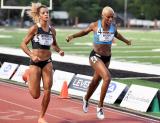Folders |
Victoria Jackson Says Time Is Right To Change 'Power Dynamics' On CampusPublished by
Former Champion Sees Pivotal Moment In College Athletics By Theresa Juva Brown for DyeStat Victoria Jackson is familiar with leading a pack. As a former high school distance star, NCAA Division 1 track champion and retired professional runner, Jackson, 38, has always found her way to the top. So it’s no surprise that Jackson — now a revered sports historian who has written for The Boston Globe, The Washington Post and The Los Angeles Times — is leading a national conversation on how race, gender and power, which are at the heart of Black Lives Matter demonstrations across the United States, intersect with college athletics. “The college sports system, in its current form, represents another American institution perpetuating the undervaluing of Black lives,” said Jackson, an assistant clinical professor at Arizona State University and one of the country's top experts on the history and culture of college sports. In June, when many were hopeful the COVID-19 crisis would recede in time for fall sports, Jackson was among the first to call for the cancelation of the college football season. In a Boston Globe essay, she argued that schools should use the break as an opportunity for reform.
Playing in exchange for a free college education and putting themselves at risk for serious head injuries, young Black men help bring in millions of dollars in revenue for colleges and universities. But that money winds up subsidizing predominantly white sports, such as rowing, and supporting academic institutions that don’t serve Black men well. At Louisiana State University, for example, only a third of black male athletes graduate, Jackson noted, citing a study from the USC Race and Equity Center. “If colleges really believe #BlackLivesMatter, they’ll figure out how to do better by their Black football players,” she wrote. Jackson — who acknowledges she came from a privileged background (Chicago's suburbs) that prepared her for college — said her experience as an athlete at the University of North Carolina at Chapel Hill and then Arizona State University gives her a unique perspective as a scholar. “It’s hard to explain to outsiders the power dynamics (of intercollegiate athletics), the culture of winning, the pressure athletes put on themselves, the mixed messaging they receive from the many different people who hold authority over them,” she said. “I bring empathy to the way I think about athletes and the challenges they face to balance academic and athletic roles and responsibilities.” While Jackson reached the pinnacle of success in college running, her journey was not smooth. Battling depression and an eating disorder since she was a child, Jackson didn’t compete her last two years at UNC. But when she enrolled as a Ph.D. history student at Arizona State University in 2004, she launched a stunning comeback. There, coached by Louie Quintana, she captured the national title in the 10,000 meters at the 2006 NCAA Division 1 Outdoor Championships. “Louie and I clicked,” she said, noting that they both embrace a balance between academics and athletics. Jackson always planned to earn a doctorate, but also wanted to give professional running a shot. After finishing her master’s degree at ASU, Jackson signed with Nike and ran professionally from 2006-08. Although she was injured during much of her Nike career, “I’m so glad I took the giant leap into giving pro running a try when it hadn’t been my plan,” she said. “I got to travel and meet amazing people.” Those experiences inspired her when she returned to graduate school in 2009. “I gained a better sense of the role of sport in society, and recognized we could be doing a lot more to take sport seriously in academia,” she said. So she set out to learn as much as possible about sports history, ultimately turning her focus to big-time college sports and race, gender, and education in the United States. Jackson’s longtime friend Lisa Aguilera, the once reigning American women’s 3,000-meter steeplechase record holder and a former ASU standout, said Jackson's exceptional focus that made her a champion runner is why she has also flourished as a scholar. "She literally got her PHD while pregnant and taking care of her newborn son, Carter,” said Aguilera, 40, of Phoenix. “She seems like super woman sometimes.” In addition to her work as a public intellectual, Jackson runs 65 miles a week, does strength training and takes care of her 5-year-old son. “I am a better mom because I run every day," she said. "I am a better scholar because I run every day.” And there are signs her work as a scholar is making a difference. Pac-12 and Big Ten football players recently released a lists of demands, calling on college leaders to improve COVID safety protocols, expand medical coverage and share football revenue with athletes, among other things. Athletes’ rising voices have also caught the attention of Democratic lawmakers, who announced this month they would introduce “College Athletes Bill of Rights” legislation later this year. Meanwhile, Jackson remains steadfast in her mission. Through writing, speaking and advocating, “my hope is that I can contribute in my very small way to help make the world better through sport,” Jackson said, “and make sport do better by all its people.” More news |








